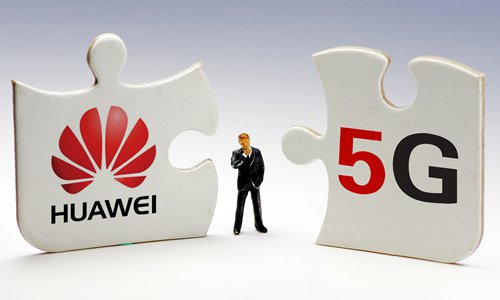HOME >> OPINION
Britain needs Huawei 5G to maintain a competitive edge
By Adam Garrie Source:Global Times Published: 2019/8/19 20:53:40

Photo: IC
John Bolton has a reputation for being a staunchly pro-war/pro-interventionism National Security Advisor in the White House. This is why it was somewhat odd that on his recent visit to the UK from August 11 to 13, Bolton appeared to play the role of a trade negotiator.
On the surface, Bolton's meetings in London appeared to go rather well. Unlike the more pro-Brussels former British prime minister Theresa May, Boris Johnson's government is increasingly emblematic of a strand of British political thought that is wholly pro-US. As post-Brexit Britain will need many new trade deals across the world, Johnson's team has prioritised a potentially game-changing FTA (free trade agreement) with the US.
But while Britain has traditionally benefited from being a free trading nation, an FTA with the US must not be used to cut Britain off from additional global trading opportunities. There is no reason why Britain, for example, cannot make new and expansive trading agreements with countries as diverse as the US and also major Asian economies, ranging from China and South Korea to Singapore and India.
Under normal circumstances, nothing would prevent the UK from signing multiple FTAs and similar deals around the world. However, the US has developed a reputation for attaching strings to some of its trading agreements. The new US-Mexico-Canada Agreement, for example, gives Washington effective veto power over the two smaller partners' ability to ratify their own FTAs with third parties.
When it comes to Bolton's offer to the UK, a major sticking point has been Huawei. The UK is set to use Huawei technology to build the country's 5G network. As Britain's current 4G network has fallen behind many similar sized European countries, it is all the more crucial to catch up by developing a 5G network that could potentially revolutionize data speeds throughout the UK.
Although Britain shares many global concerns with the US, thus far, the UK has not adopted US unilateral position on Huawei. The US continues to name Huawei as a threat to its national security in spite of the fact that Huawei hardware and software being used across the globe have not once resulted in any activity that compromises security. Moreover, Huawei has been completely transparent about its 5G technology driving civilian consumer products rather than anything related to the intelligence community.
At a time when the world faces increasing global economic uncertainties, the UK cannot afford to shortchange its own technological development by following the US into an anti-Huawei position. Even the US with its own high-tech industrial base has thus far fallen behind Huawei in terms of 5G development. For Britain there is literally no suitable 5G choice for industry nor for consumers other than Huawei and therefore if Johnson's government is not able to stand up to John Bolton on this matter, it is the British consumer and British businesses that will suffer during already challenging times.
The key to any special relationship is one that is able to make compromises in pursuit of win-win outcomes. This is the way China continues to deal with its multiple trading partners across the globe. As such, there is no reason, from China's perspective, why the UK cannot expand trade in a post-Brexit era with both the US and China. From UK's perspective, it would be foolish to cut out either of the world's two largest economies in a post-Brexit era as expanded trade with China and the US would afford British producers and consumers the widest possible variety of commercial opportunities for the long term.
Bolton did not receive the definitive agreement on Huawei that he appeared to have sought and in future months it will be essential for the UK to defend its interests when it comes to Huawei. Unless the UK wants to develop a reputation for being far behind on mobile data technology, Huawei is the only sound option. Moreover, there is nothing about Huawei building Britain's new 5G network that in any way negatively impacts US longstanding ties with the UK.
Bolton may have wanted to back Britain into a corner, but there is still every possibility to achieve a win-win outcome when it comes to both US-UK relations and China-UK relations.
The author is director of Eurasia Future, an independent news platform. opinion@globaltimes.com.cn
Newspaper headline: Britain needs Huawei 5G to maintain an international competitive edge
Posted in: VIEWPOINT